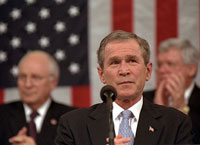Bush administration claims: aid cutoffs to Pakistan illegal
The Bush administration inferred that there were no legal reasons to cut hundreds of millions of dollars in support for Pakistan.

U.S. assistance to the key anti-terrorism and nuclear armed ally which has totaled nearly $10 billion (Ђ6.8 billion) since 2001 is governed by numerous legislative requirements that could trigger automatic aid cutoffs, but all are covered by locked-in presidential waivers, according to officials familiar with the findings a government-wide review.
Those waivers, which exempt Pakistan from aid restrictions, do not need to be renewed until Congress approves the pending budget for the current fiscal year that began on Oct. 1 and requests $845 million (Ђ575.5 million) for Pakistan, the officials said, citing preliminary determinations from the interagency review that began this week after Musharraf's action.
"No one at this point believes there is anything automatic that has to kick in," said one senior official. "The waivers are valid until Congress gets around to passing the fiscal '08 budget."
The initial findings do not mean that aid to Pakistan will never be cut, only that there is currently no statutory reason to do so, that official and two others said. They spoke on condition of anonymity because the review is not yet finalized. It was not immediately clear on Friday when it would be complete.
The officials discussed the findings as congressional pressure mounts on the administration to respond to the situation, which took an ominous turn on Friday when Pakistani authorities placed opposition leader Benazir Bhutto under house arrest and barred her supporters from staging a mass demonstration against Musharraf's emergency rule.
As it has done since the crisis erupted last Saturday, the White House called on Musharraf to restore "constitutional order and democratic norms," adding a new appeal for the release of Bhutto and other detainees believed to number in the thousands.
"Former Prime Minister Bhutto and other political party members must be permitted freedom of movement and all protesters released," said Gordon Johndroe, a spokesman for the National Security Council, in a statement released from Texas where President George W. Bush is spending the weekend.
In Washington, the State Department noted that some Pakistani officials had promised Bhutto's house arrest would be temporary and reiterated that Washington opposed Musharraf's actions.
Meanwhile, Defense Secretary Robert Gates voiced concern that the political turmoil there will undermine the Pakistani army's fight against terrorism.
"The concern I have is that the longer the internal problems continue, the more distracted the Pakistani army and security services will be in terms of the internal situation rather than focusing on the terrorist threat in the frontier area," he told reporters earlier Friday on his plane en route home from a weeklong visit to Asia.
To date, the Pentagon has said the unrest has had no effect on U.S. military operations. But Gates' comments underscored the administration's nervousness, even as it voices support for Musharraf as an ally in the war on terror.
Musharraf on Thursday yielded somewhat to U.S. pressure and said Pakistan would hold parliamentary election by mid-February a month later than originally planned. But he has still shown no sign of relinquishing his military post as chief of the army another key demand of opposition leaders and the Bush administration.
Bush has been obligated by law since 2002 to issue waivers for most assistance to Pakistan, declaring that direct payments to Islamabad are in the U.S. national interest because they promote the transition to democratic rule.
The officials familiar with the aid review conceded that Musharraf's recent actions are at odds with the process of democratization but noted that unless Congress enacts new legislation or passes the new budget, the existing waivers continue to apply.
Deputy Secretary of State John Negroponte spoke to the administration's position in congressional testimony on Tuesday, but did not make the connection between passage of the new budget and the waivers.
"Our judgment at the moment is that there is nothing that is automatically triggered by the current situation, that everything is covered at the moment by appropriate waivers," he said. He added, however, that "if this situation continues on more indefinitely, it will undercut political support for at least certain aspects of our assistance programs."
His comments, in response to a question from the chairman of the House Foreign Affairs Committee, Rep. Tom Lantos, a Democrat, were little noticed at the time.
Subscribe to Pravda.Ru Telegram channel, Facebook, RSS!





